Takashima, Shiga: Difference between revisions
No edit summary |
|||
| (10 intermediate revisions by the same user not shown) | |||
| Line 29: | Line 29: | ||
TotalArea = 511 | | TotalArea = 511 | | ||
PopDate = | PopDate = 2022-11-01 | | ||
Population = | Population = 46,507 (?? foreigners) | | ||
Founded = 2005.01.01 | | Founded = 2005.01.01 | | ||
| Line 51: | Line 51: | ||
Adogawa-cho:(0740)32-1002 | | Adogawa-cho:(0740)32-1002 | | ||
TouristLink = [http://www.takashima-kanko.jp/ Tourist Info] | | TouristLink = [http://www.takashima-kanko.jp/ Tourist Info] | | ||
Kokusai = | Kokusai = [http://www.city.takashima.lg.jp/www/contents/1232328300809/index.html Webpage] | | ||
VolunteerGuide = | VolunteerGuide = [https://takashima-kanko.jp/guide/ Webpage] | ||
}} | }} | ||
</div> | </div> | ||
'' | by [[Philbert Ono]], ''Updated: Nov. 11, 2022'' | ||
'''''Shiga's Big Northwest''''' | |||
'''''Shiga | '''Takashima''' (高島市; Takashima-shi) is a city in northwestern [[Shiga Prefecture]], Japan. It straddles the Hira mountains bordering with Kyoto and boasts a very long lake shore along [[Lake Biwa]]. | ||
''' | '''Famous for:''' | ||
*Shirahige Shrine's iconic torii in the lake. | |||
*Kaizu-Osaki cherry blossoms along the lakeshore. | |||
*Harie neighborhood of homes using natural spring wells. | |||
*Imazu as the birthplace of Shiga's most famous song, Biwako Shuko no Uta (Lake Biwa Rowing Song). | |||
*Mt. Hakodate-yama for skiing and flowers. | |||
In area, Takashima is one of Shiga's largest cities. The city has the following six areas based on the former towns and village which merged in Jan. 2005 to form Takashima: Adogawa, Imazu, Shin-Asahi, Makino, Takashima, and Kutsuki. Each district has its own unique characteristics and attractions. The city is so large that it would take days to see what you should see. Can't see everything in a single trip there. | In area, Takashima is one of Shiga's largest cities. The city has the following six areas based on the former towns and village which merged in Jan. 2005 to form Takashima: Adogawa, Imazu, Shin-Asahi, Makino, Takashima, and Kutsuki. Each district has its own unique characteristics and attractions. The city is so large that it would take days to see what you should see. Can't see everything in a single trip there. | ||
| Line 78: | Line 83: | ||
<table> | <table> | ||
<tr> | <tr> | ||
<td><span class="plainlinks"><a href="https://photoguide.jp/pix/thumbnails.php?album=127" class="external text" title="https://photoguide.jp/pix/thumbnails.php?album=127" rel="nofollow"><img src="https://photoguide.jp/pix/albums/shiga/takashima/imazu/ | <td><span class="plainlinks"><a href="https://photoguide.jp/pix/thumbnails.php?album=127" class="external text" title="https://photoguide.jp/pix/thumbnails.php?album=127" rel="nofollow"><img src="https://photoguide.jp/pix/albums/shiga/takashima/imazu/thumb_im129-20210131_0956.jpg" alt="thumb_im129-20210131_0956.jpg" /></a></span> | ||
</td><td><span class="plainlinks"><a href="https://photoguide.jp/pix/thumbnails.php?album=135" class="external text" title="https://photoguide.jp/pix/thumbnails.php?album=135" rel="nofollow"><img src="https://photoguide.jp/pix/albums/shiga/takashima/shinasahi/thumb_hr115-20090429_5280.jpg" alt="thumb_hr115-20090429_5280.jpg" /></a></span> | </td><td><span class="plainlinks"><a href="https://photoguide.jp/pix/thumbnails.php?album=135" class="external text" title="https://photoguide.jp/pix/thumbnails.php?album=135" rel="nofollow"><img src="https://photoguide.jp/pix/albums/shiga/takashima/shinasahi/thumb_hr115-20090429_5280.jpg" alt="thumb_hr115-20090429_5280.jpg" /></a></span> | ||
</td><td><span class="plainlinks"><a href="https://photoguide.jp/pix/thumbnails.php?album=140" class="external text" title="https://photoguide.jp/pix/thumbnails.php?album=140" rel="nofollow"><img src="https://photoguide.jp/pix/albums/shiga/takashima/kaizurikishi/thumb_kr027-20090429_5564.jpg" alt="thumb_kr027-20090429_5564.jpg" /></a></span> | </td><td><span class="plainlinks"><a href="https://photoguide.jp/pix/thumbnails.php?album=140" class="external text" title="https://photoguide.jp/pix/thumbnails.php?album=140" rel="nofollow"><img src="https://photoguide.jp/pix/albums/shiga/takashima/kaizurikishi/thumb_kr027-20090429_5564.jpg" alt="thumb_kr027-20090429_5564.jpg" /></a></span> | ||
| Line 116: | Line 121: | ||
===Imazu 今津=== | ===Imazu 今津=== | ||
*[ | *[https://shiga-ken.com/blog/2022/01/lake-biwa-rowing-song-museum/ Lake Biwa Rowing Song Museum] (''Biwako Shuko no Uta Shiryokan'' 琵琶湖周航の歌資料館) - Small museum dedicated to Shiga's most famous song. Near [[Omi-Imazu Station]]. [http://goo.gl/maps/AuJM8 Map] | ||
* [https://photoguide.jp/pix/thumbnails.php?album=517 Lake Biwa Rowing Song Monument and Imazu Port] 琵琶湖周航の歌記念碑 - At Imazu Port, a monument for Shiga's most famous song, composed in Imazu. Boats also go to Chikubushima island in Lake Biwa. Near [[Omi-Imazu Station]]. [http://goo.gl/maps/EvdAc Map] | * [https://photoguide.jp/pix/thumbnails.php?album=517 Lake Biwa Rowing Song Monument and Imazu Port] 琵琶湖周航の歌記念碑 - At Imazu Port, a monument for Shiga's most famous song, composed in Imazu. Boats also go to Chikubushima island in Lake Biwa. Near [[Omi-Imazu Station]]. [http://goo.gl/maps/EvdAc Map] | ||
*Imazu Vories Museum 今津ヴォーリズ資料館 - A renovated former bank designed by Vories. Near [[Omi-Imazu Station]]. [http://goo.gl/maps/FS2wY Map] | *Imazu Vories Museum 今津ヴォーリズ資料館 - A renovated former bank designed by Vories. Near [[Omi-Imazu Station]]. [http://goo.gl/maps/FS2wY Map] | ||
| Line 155: | Line 160: | ||
*Mid-Nov. - Lake Biwa Hot-Air Balloon Race - Takes place early in the monring on the lake beach. The balloons try to cross the lake. | *Mid-Nov. - Lake Biwa Hot-Air Balloon Race - Takes place early in the monring on the lake beach. The balloons try to cross the lake. | ||
*Winter - Skiing on mountains in Hakodate-yama (especially), Makino, and Kutsuki. | *Winter - Skiing on mountains in Hakodate-yama (especially), Makino, and Kutsuki. | ||
<HTML> | |||
<script> | |||
(function(d, s, id) { | |||
if (d.getElementById(id)) { | |||
if (window.__TOMORROW__) { | |||
window.__TOMORROW__.renderWidget(); | |||
} | |||
return; | |||
} | |||
const fjs = d.getElementsByTagName(s)[0]; | |||
const js = d.createElement(s); | |||
js.id = id; | |||
js.src = "https://www.tomorrow.io/v1/widget/sdk/sdk.bundle.min.js"; | |||
fjs.parentNode.insertBefore(js, fjs); | |||
})(document, 'script', 'tomorrow-sdk'); | |||
</script> | |||
<div class="tomorrow" | |||
data-location-id="064439" | |||
data-language="EN" | |||
data-unit-system="METRIC" | |||
data-skin="light" | |||
data-widget-type="upcoming" | |||
style="padding-bottom:22px;position:relative;" | |||
> | |||
<a | |||
href="https://www.tomorrow.io/weather-api/" | |||
rel="nofollow noopener noreferrer" | |||
target="_blank" | |||
style="position: absolute; bottom: 0; transform: translateX(-50%); left: 50%;" | |||
> | |||
<img | |||
alt="Powered by the Tomorrow.io Weather API" | |||
src="https://weather-website-client.tomorrow.io/img/powered-by.svg" | |||
width="250" | |||
height="18" | |||
/> | |||
</a> | |||
</div> | |||
</HTML> | |||
=== Travel Tips === | === Travel Tips === | ||
*The lake shore is very scenic especially on sunny days. You can clearly see Chikubushima and Mt. Ibuki across the lake. Rent a bicycle at a train station and ride along the shore. Rental bicycles are available at the tourist info booths at the following train stations in Takashima: [[Makino Station]], [[Omi-Imazu Station]], [[Omi-Takashima Station]], and [[Shin-Asahi Station]] (West exit). They provide maps as well. | *The lake shore is very scenic especially on sunny days. You can clearly see Chikubushima and Mt. Ibuki across the lake. Rent a bicycle at a train station and ride along the shore. Rental bicycles are available at the tourist info booths at the following train stations in Takashima: [[Makino Station]], [[Omi-Imazu Station]], [[Omi-Takashima Station]], and [[Shin-Asahi Station]] (West exit). They provide maps as well. | ||
*To visit Shirahige Shrine (torii in the lake), rent a bicycle at Omi-Takashima Station or catch a taxi. | *To visit Shirahige Shrine (torii in the lake), rent a bicycle at Omi-Takashima Station or catch a taxi. | ||
*Takashima is large city in area. You cannot travel everywhere and see everything during a day trip. Either lodge within the city or decide which region to visit beforehand. | *Takashima is large city in area. You cannot travel everywhere and see everything during a day trip. Either lodge within the city or decide which region to visit beforehand. | ||
*Current [ | *Current [https://www.jma.go.jp/bosai/warning/#area_type=class20s&area_code=2521200&lang=en weather warnings/advisories for Takashima here] (Japan Meteorological Agency). | ||
== Getting There == | == Getting There == | ||
| Line 255: | Line 300: | ||
== Additional Reading == | == Additional Reading == | ||
<HTML> | <HTML> | ||
<a class="twitter-timeline" data-height="1500" href="https://twitter.com/ShigaHeadlines/timelines/1357002462054412288?ref_src=twsrc%5Etfw">Takashima News - Curated tweets by ShigaHeadlines</a> <script async src="https://platform.twitter.com/widgets.js" charset="utf-8"></script> | <a class="twitter-timeline" data-width="500" data-height="1500" href="https://twitter.com/ShigaHeadlines/timelines/1357002462054412288?ref_src=twsrc%5Etfw">Takashima News - Curated tweets by ShigaHeadlines</a> <script async src="https://platform.twitter.com/widgets.js" charset="utf-8"></script> | ||
</HTML> | </HTML> | ||
*[https://shiga-ken.com/blog/2014/02/skiing-in-shiga-prefecture/ Skiing at Makino Highland] - February 12, 2014 | *[https://shiga-ken.com/blog/2014/02/skiing-in-shiga-prefecture/ Skiing at Makino Highland] - February 12, 2014 | ||
| Line 284: | Line 329: | ||
== Related Articles == | == Related Articles == | ||
*[[Biwako Shuko no Uta]] - Shiga's most famous song about rowing around Lake Biwa. | *[[Biwako Shuko no Uta]] - Shiga's most famous song about rowing around Lake Biwa. | ||
*[ | *[https://shiga-ken.com/blog/2022/01/lake-biwa-rowing-song-museum/ Lake Biwa Rowing Song Museum] (Biwako Shuko no Uta Shiryokan) - Song museum. | ||
* [[Shiga Prefecture]] | * [[Shiga Prefecture]] | ||
* [[Shiga Prefecture Sights]] | * [[Shiga Prefecture Sights]] | ||
Latest revision as of 07:32, 13 November 2022
| Takashima, Shiga (高島市; Takashima-shi) | ||
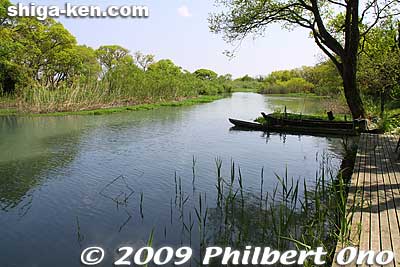 Harie More Takashima photos here. Harie More Takashima photos here.
| ||

| ||
| Location | Shiga Prefecture, Kinki region, Honshu island, JAPAN | |
| Population | 46,507 (?? foreigners) (2022-11-01) | |
| Area | 511 km² | |
| City Centers | Takashima Station, Omi-Imazu Station | |
| Major Sights | Kaizu Osaki, Makino Kogen Highland, Kutsuki | |
| Major Gateways | JR Kosei Line Omi-Takashima Station, Omi-Imazu Station | |
| Train Stations | JR Kosei Line Omi-Takashima Station, Adogawa Station, Shin-Asahi Station, Omi-Imazu Station, Omi-Nakasho Station, Makino Station | |
| Claim to Fame | Kaizu Osaki is one of Japan's 100 Best Places for cherry blossoms | |
| Products | funa-zushi, Saba no Narezushi, fans and fan ribs | |
| Neighbors | Otsu, Kyoto (Kyoto Pref.) | |
| Old Name(s) | Takashima-gun (Takashima-cho, Imazu-cho, Adogawa-cho, Makino-cho, Shin-Asahi-cho, Kutsuki-mura) | |
| Keywords | senkotsu (fan ribs), Biwako Shuko no Uta, Oguchi Taro | |
| Historical Persons | Nakae Toju | |
| Links | Takashima Articles | Takashima Photos | |
| Takashima Tourist Information | ||
| Location | 520-1401滋賀県高島市朽木市場777
Kutsuki Ichiba 777, Takashima-shi, Shiga 520-1401 JAPAN | |
| Phone | 0740-38-3970
Makino-cho: 0740-28-1188 Takashima-cho: 0740-36-2009 Imazu-cho: (0740)22-2108 Adogawa-cho:(0740)32-1002 | |
| Tourist Links | Tourist Info | |
| Int'l Association | Webpage | |
| Volunteer Guides | Webpage | |
| Takashima City Hall 高島市役所 | ||
| Address | 520-1592滋賀県高島市新旭町北畑565番地 | |
| Phone/Fax | (0740) 25-8130 | |
| Official Site | Japanese | | |
| Symbols | Flower: | None |
| Tree: | None | |
| Bird: | None | |
| Others: | -- | |
| Logo: | ||
| Sister Cities | Petoskey and Garden City, Michigan USA; Ireland; Zhuzhou, Hunan, China; Yuyao, Zhe jiang, China; Beijing, China; Taejang-ri, South Korea; Niseko, Hokkaido; Yama-gun, Tsuruga, Fukui; Suita, Osaka; Takashima, Nagasaki; Moriguchi, Osaka; Ozu, Ehime; Kawage, Mie; Ie Village, Okinawa; Nemuro, Hokkaido; Morioka, Iwate; Asahi Ward, Osaka City, Osaka | |
by Philbert Ono, Updated: Nov. 11, 2022
Shiga's Big Northwest
Takashima (高島市; Takashima-shi) is a city in northwestern Shiga Prefecture, Japan. It straddles the Hira mountains bordering with Kyoto and boasts a very long lake shore along Lake Biwa.
Famous for:
- Shirahige Shrine's iconic torii in the lake.
- Kaizu-Osaki cherry blossoms along the lakeshore.
- Harie neighborhood of homes using natural spring wells.
- Imazu as the birthplace of Shiga's most famous song, Biwako Shuko no Uta (Lake Biwa Rowing Song).
- Mt. Hakodate-yama for skiing and flowers.
In area, Takashima is one of Shiga's largest cities. The city has the following six areas based on the former towns and village which merged in Jan. 2005 to form Takashima: Adogawa, Imazu, Shin-Asahi, Makino, Takashima, and Kutsuki. Each district has its own unique characteristics and attractions. The city is so large that it would take days to see what you should see. Can't see everything in a single trip there.
Particularly famous are Shirahige Shrine with the iconic torii gate in the lake, Kaizu-Osaki in Makino, for lakeshore cherry blossoms in April. The Harie area in Shin-Asahi is blessed with clean spring water gushing up to residents' homes 24/7. Tours by volunteer guides are provided. Imazu is the birthplace of Shiga's most famous song, Biwako Shuko no Uta (Lake Biwa Rowing Song). It also has Imazu Port where you can catch a boat to visit Chikubushima island.
Adogawa was home to Nakae Toju, a well-known Confucian scholar. A small museum, shrine, etc., are dedicated to him. Adogawa also produces the Adoberry, a type of boisenberry. There is a tourist information booth in all of the JR train stations in Takashima except Omi-Nakasho Station. Pick up maps and pamphlets for each area. Most train stations in the city also have rental bicycles. You can rent a bicycle at a train station and return it at another train station in the city.
The Takashimaya Department Store chain is named after Takashima. Ironically, no branch is found in Takashima nor in Shiga.
Sights
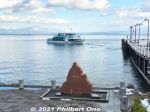
| 
| 
|
| Imazu | Harie kabata | Kaizu Rikishi Matsuri |

| 
| 
|
| Kaizu-Osaki | Omizo Castle | Kawakami Matsuri |

| 
| 
|
| Shichikawa Matsuri | Omizo Matsuri | Makino |
The city has six areas each having its own attractions:
Makino マキノ
- Kaizu Osaki 海津大崎 - Along the scenic northern shore of Lake Biwa, best known for cherry blossoms in April. One of Japan's 100 Best Places for Cherry Blossoms. Map
- Makino Sunny Beach - Swimming beach in summer. Map
- Makino Highland マキノ高原 - At the foot of a mountain, with rivers, hiking trails, putting golf course, and skiing. Map
Imazu 今津
- Lake Biwa Rowing Song Museum (Biwako Shuko no Uta Shiryokan 琵琶湖周航の歌資料館) - Small museum dedicated to Shiga's most famous song. Near Omi-Imazu Station. Map
- Lake Biwa Rowing Song Monument and Imazu Port 琵琶湖周航の歌記念碑 - At Imazu Port, a monument for Shiga's most famous song, composed in Imazu. Boats also go to Chikubushima island in Lake Biwa. Near Omi-Imazu Station. Map
- Imazu Vories Museum 今津ヴォーリズ資料館 - A renovated former bank designed by Vories. Near Omi-Imazu Station. Map
- Gokurakuji Garden 極楽寺庭園 - Japanese-style garden in Imazu-cho.
- Mt. Hakodate-yama 箱館山 - Popular for skiing and flowers in spring. Map
Shin-Asahi 新旭
- STAGEX Takashima (STAGEX高島) - Formerly Asahi Windmill Village (あさひ風車村) that closed and reopened as this glamping resort in July 2018. No English information. Map
- Harie 針江 - Near Shin-Asahi Station, an small area of local homes which have "kabata" wells to draw up pure spring water 24/7. Guided tours (1,000 yen) of these homes are available through a local NPO called Shozu-no-Sato Committee 針江生水の郷委員会. In 2014, they won the top Ecotourism Grand Prize エコツーリズム大賞 sponsored by the Japan Ecotourism Society and Environment Ministry. Highly recommended and one of Shiga's best places to visit. Call 090-3168-8400 in Japanese. Web site here Map
Adogawa 安曇川
- Gyokusenji Temple 玉泉寺 - Noted for many stone buddhas. In Adogawa.
- Nakae Toju Memorial Hall 中江藤樹 - Small museum dedicated to Nakae Toju, Confucian philosopher. Also nearby is the Toju Shoin Study Room where he studied, his gravesite, and Toju Shrine. 15-min. walk from Adogawa Station. Map
- Omi-Shirahama Beach - White sand beach. Map
Kutsuki 朽木
- Tahoto Pagoda 多宝塔 - Aesthetic pagoda in the Kutsuki area.
Takashima 高島町
- Shirahige Shrine 白鬚神社 - Best known for its landmark red torii in Lake Biwa. Bicycle from Omi-Takashima Station. Map
- Kamogawa Stone Buddhas 鴨川48体石仏群 - Large group of stone buddhas made in 1553 by Sasaki Rokkaku Yoshikata (佐々木六角 義賢), lord of Kannonji Castle in Azuchi in memory of his deceased mother. Map
- Gulliver Youth Travel Village ガリバー青少年旅行村 - Outdoor recreation park near the mountains. Map
- Omizo Castle ruins 大溝城跡- Originally built in 1578 by Oda Nobusumi (Nobunaga's nephew), it was taken over by Mitsunobu Wakebe from Mie Prefecture in 1619. The Honmaru stone foundation remains. Near Omi-Takashima Station. Map
- Ozuka Kofun Tumulus 王塚古墳 - Ancient tumulus or burial mound.
- Terraced rice paddies 棚田 - Near Omi-Takashima Station.
- Yatsubuchi no Taki 八ツ淵の滝 - Series of eight waterfalls along a 1-km hiking trail near Gulliver Park. Map
Event Calendar
- April 18 - Kawakami Matsuri Festival 川上まつり is held in Imazu. Held annually on April 18 by Hioki and Tsuno Shrines in Imazu, this festival features a pair of very tall (18 meters), decorated bamboo poles called O-nobori carried little by little at a horse-riding course. There are also children in costume playing music with drums and bells and others carrying a decorated branch called sanyare. Map (Tsuno Shrine) Map (Horse-riding course)
- April 29 - Kaizu Rikishi Matsuri Festival 海津力士祭り - Held annually by Kaizuten Jinja Shrine on April 29, this local festival features men dressed as sumo wrestlers (rikishi) carrying two mikoshi portable shrines around their respective neighborhoods. They wear kesho mawashi ceremonial aprons. They jostle the mikoshi during the day, and then at night they go to the shrine for the festival climax with lit torches. Map
- May 3-4 - Omizo Matsuri Festival 大溝祭 is held by Hiyoshi Jinja Shrine near Omi-Takashima Station (JR Kosei Line). It's a festival of five ornate floats pulled around town. May 3 is the festival eve when the floats are lit with paper lanterns and paraded around the neighborhood of Omi-Takashima Station. May 4 is the daytime procession of the five floats starting at 10 am and ending at 3:30 pm. By 11 am, the five floats gather at Hiyoshi Jinja Shrine where they throw mochi rice cakes to the crowd. The floats are smaller than those at Otsu Matsuri and Nagahama Hikiyama Matsuri. This festival is not crowded at all. Map
- May 4 - Shichikawa Matsuri Festival 七川祭 is held by Oarahiko Shrine 大荒比古神社, a few kilometers from Shin-Asahi Station. This crowd-pleasing festival features a procession, yabusame horseback archery, full-speed galloping horses, and a portable shrine procession. The procession starts at around noon with young men carrying wooden archery targets dancing their way to Oarahiko Shrine. The shrine grounds has a long, straight path for the yabusame horseback archer who makes a few runs along with other horseback riders racing through. The shrine is quite far from Shin-Asahi Station. Taking a taxi or renting a bicycle from the local tourist info office near the station is recommended. Map
- Sept. 5-6 - Shirahige Festival, Shirahige Shrine.
- Mid-Nov. - Lake Biwa Hot-Air Balloon Race - Takes place early in the monring on the lake beach. The balloons try to cross the lake.
- Winter - Skiing on mountains in Hakodate-yama (especially), Makino, and Kutsuki.
Travel Tips
- The lake shore is very scenic especially on sunny days. You can clearly see Chikubushima and Mt. Ibuki across the lake. Rent a bicycle at a train station and ride along the shore. Rental bicycles are available at the tourist info booths at the following train stations in Takashima: Makino Station, Omi-Imazu Station, Omi-Takashima Station, and Shin-Asahi Station (West exit). They provide maps as well.
- To visit Shirahige Shrine (torii in the lake), rent a bicycle at Omi-Takashima Station or catch a taxi.
- Takashima is large city in area. You cannot travel everywhere and see everything during a day trip. Either lodge within the city or decide which region to visit beforehand.
- Current weather warnings/advisories for Takashima here (Japan Meteorological Agency).
Getting There
Takashima is served by the JR Kosei Line which has the following train stations within the city: Omi-Takashima Station (近江高島), Adogawa Station (安曇川), Shin-Asahi Station (新旭), Omi-Imazu Station (近江今津), Omi-Nakasho Station (近江中庄), and Makino Station (マキノ).
- JR Kosei Line - Easily accessible from Kyoto Station (taking 50 min.) and Yamashina Station (in Kyoto). From Nagahama Station, a train transfer at Omi-Shiotsu Station is required.
- By boat from Chikubushima. From Hikone or Nagahama across the lake, take a boat to Chikubushima, then on to Imazu.
Getting Around
Some sights are within walking distance of the train station, but others require bus or taxi, especially to Kutsuki which is far inland.
The major sights and facilties along the train lines are as follows:
JR Kosei Line
- Omi-Takashima Station (近江高島) - Shirahige Jinja Shrine (torii in lake), Haginohama Beach, Omizo Castle, Otomegaike Pond, Ireland Koryukan Village
- Adogawa Station (安曇川) - Biwako Kodomo no Kuni, Yomeien Garden, Nakae Toju Museum and shrine.
- Shin-Asahi Station (新旭) - Shin Asahi Windmill Village
- Omi-Imazu Station (近江今津) - Imazu-ko Pier (boat to Chikubushima island), Lake Biwa Rowing Song Museum (Biwako Shuko no Uta Shiryokan), Biwako Shuko no Uta song monument, Imazu Vories Shiryokan museum, Mt. Hakodate-yama,
- Omi-Nakasho Station (近江中庄) -
- Makino Station (マキノ) - Makino Sunny Beach, Kaizu Osaki coast, Makino Highland
By bus
- Buses leave from all train stations on the Kosei Line within Takashima. Since Takashima covers such a large area, it employs a large network of local bus lines.
By bicycle
Rental bicycles are available at the following train stations in Takashima: Makino Station, Omi-Imazu Station, Omi-Takashima Station, and Shin-Asahi Station (West exit).
Maps
Click on upper right icon to enlarge the map.
Photos
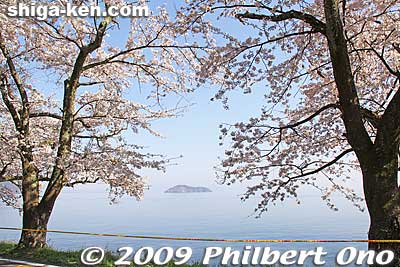
| 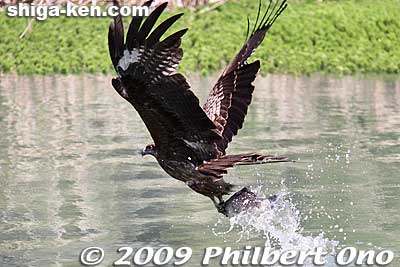
|
| Kaizu-Osaki in spring | Nakajima |
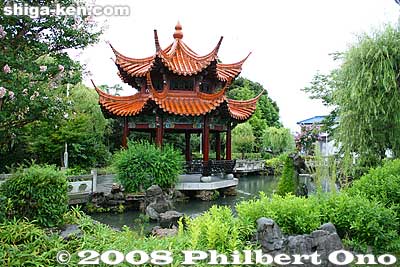
| 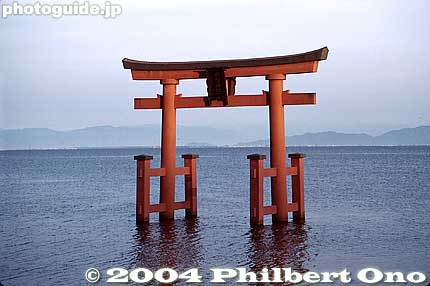
|
| Yomeien Garden, Adogawa | Shirahige Shrine torii |
More photos at Takashima Photos. More Shiga photos here.
Videos
Click on the video image to play the video.
More Shiga videos here.
Side Trips
Other sights in neighboring cities/towns within easy reach from Takashima.
- Chikubushima 竹生島 - An island in northern Lake Biwa, Shiga Prefecture. Easily accessible by boat from Imazu Port, the island has a large temple complex called Hogonji which includes buildings designated as National Treasures.
History
Takashima was historically a significant crossroads between the Hokuriku Region and Kyoto and Nara which used to be the country's capital.
- 1917 Oguchi Taro and his boat crewmates compose the song, "Biwako Shuko no Uta" at an inn in Imazu.
- 1950s Takashima originally consisted of 17 villages. Except for Kutsuki Village, all these villages merged to form five towns: Adogawa-cho, Imazu-cho, Shin Asahi-cho, Makino-cho, and Takashima-cho
- 2005 January 1: All five towns and one village in the former Takashima-gun comprising Adogawa-cho, Imazu-cho, Shin-Asahi-cho, Makino-cho, and Takashima-cho towns and Kutsuki-mura village merged to form Takashima city. Takashima-gun county was thereby dissolved.
Additional Reading
Takashima News - Curated tweets by ShigaHeadlines
- Skiing at Makino Highland - February 12, 2014
- Shichikawa Matsuri, one of Shiga’s Top 10 festivals in April-May - April 11, 2013
- Kaizu Osaki, Shiga’s Top 5 cherry blossom spots - March 24, 2013
- Yatsubuchi Falls - July 12, 2011
- Takashima movie (NHK Special): Satoyama (里山) - August 8, 2009
- Harie one of Japan’s 100 Best Spring Waters - June 10, 2008
- Rowing with Imazu Jr. High School Rowing Club - August 19, 2007
- Lake Biwa Rowing Song CD - July 8, 2007
Miscellaneous
Trivia
- Makino was Japan's first town to have its name in katakana when it was established in 1955 upon the merger of a few villages. It was named after Makino Ski Grounds which used katakana for "Makino." Makino Ski Grounds was built in the 1910s/20s when skiing was an exotic import sport. They decided to change the name Makino using katakana マキノ instead of the original kanji of 牧野 since it matched well with スキー which was also in katakana. This was in 1930. Makino Ski Ground was quite well-known in the Kansai area, so they decided to use "Makino" for the town name. Thus, Makino was named after a local ski resort. Makino is one of only two towns in Japan with a katakana name. The other is Niseko in Hokkaido.
- Takashimaya Department Store was named after Takashima district (now city). The store's founder's father hailed from Takashima.
Famous People
- Nakae Toju 中江藤樹 (1608-1648)
- Native of Adogawa, Takashima and one of Japan's leading Neo-Confucian philosophers. He taught that the highest virtue was filial piety. To care for his ailing mother, he escaped from his samurai career and returned to Takashima in 1634 where he started his Neo-Confucian school. His large following ranged from samurai to merchants, all treated equally. He was also dubbed the "Saint of Omi." There is the Nakae Toju Memorial Museum in Takashima.
- Oguchi Taro 小口太郎 (1897-1924)
- A Kyoto University student and member of the rowing club. He and his boatmates composed the song Biwako Shuko no Uta (Lake Biwa Rowing Song) during a rowing trip around the lake in June 1917. The song later became Shiga's most famous song.
Related Articles
- Biwako Shuko no Uta - Shiga's most famous song about rowing around Lake Biwa.
- Lake Biwa Rowing Song Museum (Biwako Shuko no Uta Shiryokan) - Song museum.
- Shiga Prefecture
- Shiga Prefecture Sights
- Shiga Prefecture Transportation
External Links
- [http ]
| Municipalities of Shiga Prefecture 滋賀県 | ||
| Cities & Towns: Aisho-cho | Higashi-Omi | Hikone | Hino-cho | Koka | Konan | Kora-cho | Kusatsu | Maibara | Moriyama | Nagahama | Omi-Hachiman | Otsu | Ritto | Ryuo-cho | Taga-cho | Takashima | Toyosato-cho | Yasu | ||
| 愛荘町 | 東近江市 | 彦根市 | 日野町 | 甲賀市 | 湖南市 | 甲良町 | 草津市 | 米原市 | 守山市 | 長浜市 | 近江八幡市 | 大津市 | 栗東市 | 竜王町 | 多賀町 | 高島市 | 豊郷町 | 野洲市 | ||
| Prefectures of Japan | ||
| Aichi | Akita | Aomori | Chiba | Ehime | Fukui | Fukuoka | Fukushima | Gifu | Gunma | Hiroshima | Hokkaido | Hyogo | Ibaraki | Ishikawa | Iwate | Kagawa | Kagoshima | Kanagawa | Kochi | Kumamoto | Kyoto | Mie | Miyagi | Miyazaki | Nagano | Nagasaki | Nara | Niigata | Oita | Okayama | Okinawa | Osaka | Saga | Saitama | Shiga | Shimane | Shizuoka | Tochigi | Tokushima | Tokyo | Tottori | Toyama | Wakayama | Yamagata | Yamaguchi | Yamanashi | ||